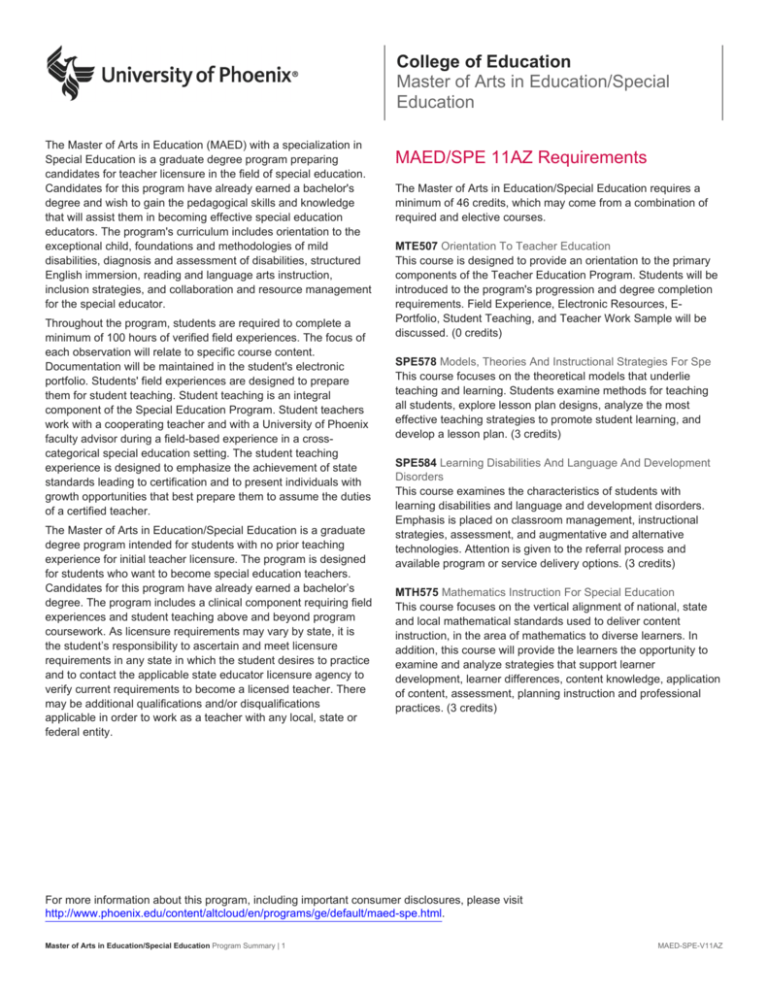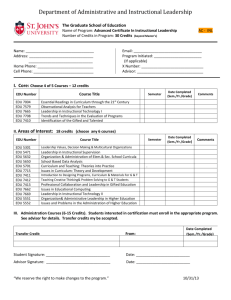Master of Arts in Education/Special Education
advertisement

College of Education Master of Arts in Education/Special Education The Master of Arts in Education (MAED) with a specialization in Special Education is a graduate degree program preparing candidates for teacher licensure in the field of special education. Candidates for this program have already earned a bachelor's degree and wish to gain the pedagogical skills and knowledge that will assist them in becoming effective special education educators. The program's curriculum includes orientation to the exceptional child, foundations and methodologies of mild disabilities, diagnosis and assessment of disabilities, structured English immersion, reading and language arts instruction, inclusion strategies, and collaboration and resource management for the special educator. Throughout the program, students are required to complete a minimum of 100 hours of verified field experiences. The focus of each observation will relate to specific course content. Documentation will be maintained in the student's electronic portfolio. Students' field experiences are designed to prepare them for student teaching. Student teaching is an integral component of the Special Education Program. Student teachers work with a cooperating teacher and with a University of Phoenix faculty advisor during a field-based experience in a crosscategorical special education setting. The student teaching experience is designed to emphasize the achievement of state standards leading to certification and to present individuals with growth opportunities that best prepare them to assume the duties of a certified teacher. The Master of Arts in Education/Special Education is a graduate degree program intended for students with no prior teaching experience for initial teacher licensure. The program is designed for students who want to become special education teachers. Candidates for this program have already earned a bachelor’s degree. The program includes a clinical component requiring field experiences and student teaching above and beyond program coursework. As licensure requirements may vary by state, it is the student’s responsibility to ascertain and meet licensure requirements in any state in which the student desires to practice and to contact the applicable state educator licensure agency to verify current requirements to become a licensed teacher. There may be additional qualifications and/or disqualifications applicable in order to work as a teacher with any local, state or federal entity. MAED/SPE 11AZ Requirements The Master of Arts in Education/Special Education requires a minimum of 46 credits, which may come from a combination of required and elective courses. MTE507 Orientation To Teacher Education This course is designed to provide an orientation to the primary components of the Teacher Education Program. Students will be introduced to the program's progression and degree completion requirements. Field Experience, Electronic Resources, EPortfolio, Student Teaching, and Teacher Work Sample will be discussed. (0 credits) SPE578 Models, Theories And Instructional Strategies For Spe This course focuses on the theoretical models that underlie teaching and learning. Students examine methods for teaching all students, explore lesson plan designs, analyze the most effective teaching strategies to promote student learning, and develop a lesson plan. (3 credits) SPE584 Learning Disabilities And Language And Development Disorders This course examines the characteristics of students with learning disabilities and language and development disorders. Emphasis is placed on classroom management, instructional strategies, assessment, and augmentative and alternative technologies. Attention is given to the referral process and available program or service delivery options. (3 credits) MTH575 Mathematics Instruction For Special Education This course focuses on the vertical alignment of national, state and local mathematical standards used to deliver content instruction, in the area of mathematics to diverse learners. In addition, this course will provide the learners the opportunity to examine and analyze strategies that support learner development, learner differences, content knowledge, application of content, assessment, planning instruction and professional practices. (3 credits) For more information about this program, including important consumer disclosures, please visit http://www.phoenix.edu/content/altcloud/en/programs/ge/default/maed-spe.html. Master of Arts in Education/Special Education Program Summary | 1 MAED-SPE-V11AZ Master of Arts in Education/Special Education SPE576 Characteristics Of Autism Spectrum Disorders This introductory course is designed to assist educators in developing strategies and techniques to support students with Autism Spectrum Disorders. This class is designed to familiarize teacher candidates with the complexity of autism spectrum disorder (ASD) and provide the theoretical background and practical instructional strategies needed for working with students with ASD. Participants will gain a better understanding of key issues related to inclusive practices, such as how to achieve in the academic success, adjust to behavioral challenges, as well as foster communication and social-perceptual thinking skills. (3 credits) SEI500 Structured English Immersion This course will introduce students to the concept of and methods for instructing in a Structured English Immersion (SEI) environment. Students will learn about assessment of K–12 students, state standards, research-based instructional activities, and lesson planning and implementation models. Students will study how a learner-centered approach to teaching can provide English Language Learners (ELL), as well as native English speakers, with a greater opportunity to interact meaningfully with educational materials as they learn subject matter and ELL acquire English. (3 credits) SEI503 Advanced Structured English Immersion Methods This course addresses Structured English Immersion (SEI) instruction and assessment of K-12 English Language Learners (ELLs), and is designed to meet the standards set by the Arizona Department of Education. It examines the legal, historical, and educational reasons for SEI, as well as theoretical principles of language acquisition and the role of culture in learning. It also emphasizes the alignment of ELL Proficiency Standards to Arizona’s Academic Standards and their application to lesson planning. The Arizona English Language Learner Assessment (AZELLA), use of alternative assessments, analysis of data, and the application of data to instruction, are emphasized as well. A final project synthesizes the concepts and instructional strategies taught in the course. (3 credits) SPE544 Characteristics Of Emotional & Behavioral Disorders This course provides an in-depth examination of students with emotional and behavioral difficulties. Attention is given to federal and state regulations, learner characteristics, student identification, and program models. Emphasis is placed on behavioral techniques, classroom management skills, and instructional practices. (3 credits) Master of Arts in Education/Special Education Program Summary | 2 SPE556 Characteristics Of Physical & Health Disabilities This course provides an overview of the unique characteristics, learning styles, and challenges faced by children with physical handicaps and other health disabilities. Attention is given to federal and state regulations as they pertain to qualifying these individuals for special services within the schools. Various program models available through public, private, and hospital settings will be reviewed. The impact of inclusive education and self-contained placements on this population will be analyzed. (3 credits) SPE574 Characteristics Of Intellectual/developmental Disabilities This course examines issues related to the instruction of students with intellectual and developmental disabilities. Attention is given to legal foundations, learner characteristics, and instructional considerations. Emphasis is placed on collaborating with families with children with intellectual and developmental disabilities. (3 credits) SPE512 Special Education Assessment And Interpretation This course focuses on the task of assessing the exceptional child, with an emphasis on measuring a child's abilities and diagnosing his or her strengths and needs. Commonly used tests and evaluation systems used in public school special education programs are examined. The course also addresses specific diagnostic procedures and the link between interpretation and the instructional process. Basic instructional, assessment, and behavioral recommendations are discussed. (3 credits) RDG570 Curriculum Const And Assmt: Reading And Lang Arts For Spe This course focuses on the most current research, theory, and methods of reading instruction, while providing students with the background knowledge in language arts necessary to prepare an integrated unit of instruction. Various instructional and assessment techniques, including research-based phonics, are modeled. A practical application project, based on work with a student in a K-8 school setting, is incorporated into the course requirements. (4 credits) SPE594 Special Education Student Teaching: Part A This course emphasizes the practical application of educational theories and methods. The course will focus on the following topics: the student teaching experience, the school culture, the learning environment, and planning, preparing, and implementing the Teacher Work Sample. The course also provides a forum for open discussion and problem solving based on student teaching classroom experiences. (4 credits) MAED-SPE-V11AZ Master of Arts in Education/Special Education SPE595 Special Education Student Teaching: Part B This course will focus on the design and implementation of the Teacher Work Sample. It also provides students practical guidance in securing a teaching position. Students will examine resumes and cover letters, teaching applications, and interview strategies. Assistance in preparing an employment portfolio will be provided. This seminar also provides a forum for open discussion and problem-solving based on student teaching classroom experiences. (4 credits) Introductory Course The Master of Arts in Education/Special Education requires a minimum of 46 credits, which may come from a combination of required and elective courses. COM516 Professional Communications This course provides new graduate students in University of Phoenix programs with an introduction to strategies for academic success within the University of Phoenix adult learning model. Topics include oral and written communication, methods for finding and evaluating course resources, critical thinking, the purpose and use of portfolios, program standards, stress and time management, and tools for collaborative learning, in preparation for team assignments in future classes. (1 credits) Foundations of Special Education The Master of Arts in Education/Special Education requires a minimum of 46 credits, which may come from a combination of required and elective courses. SPE513 Orientation To The Exceptional Child This course provides an overview of the different categories of exceptionality. Students will be introduced to special education laws and their implications for delivery systems, transition plans, and identification and placement procedures. (3 credits) University of Phoenix is accredited by the Higher Learning Commission (http://hlcommission.org). For more information about University of Phoenix accreditations and licensures, please visit http://www.phoenix.edu/about_us/accreditation.html. Please note: A typical schedule, including progression and title of courses, may vary by location and modality. Please contact an Enrollment Representative for more information. A student seeking an Iowa educator license is advised that successful completion of this institution’s program(s) of educator preparation does not qualify you for initial educator licensure by the Iowa Board of Educational Examiners. A candidate seeking licensure in the State of Iowa must first be licensed/certified as an educator in the state in which preparation was completed. This institution shall assist a candidate in contacting the appropriate licensing board in the state in which the candidate’s preparation was completed. This institution shall assist the candidate in understanding the requirements of the appropriate licensing board prior to the candidate’s completion of this institution’s program(s) of educator preparation. A candidate seeking subsequent licensure from the Iowa Board of Educational Examiners must contact that Board (515/281-5849; http://www.boee.iowa.gov/) for licensure requirements in Iowa. Master of Arts in Education/Special Education Program Summary | 3 MAED-SPE-V11AZ





